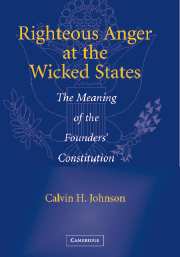Book contents
- Frontmatter
- Contents
- Acknowledgments
- Frequently Cited Sources
- Introduction
- PART ONE THE NECESSITY OF THE CONSTITUTION
- 1 The Rise of the Righteous Anger
- 2 Madison's Vision: Requisitions and Rights
- 3 The Superiority of the Extended Republic
- 4 Shifting the Foundations from the States to the People
- 5 Partial Losses
- 6 Anti-Federalism
- 7 False Issues: Bill of Rights, Democracy, and Slavery
- PART TWO LESS CONVINCING FACTORS
- PART III THE SPLIT AND THE END OF THE CONSTITUTIONAL MOVEMENT
- Concluding Summary
- Index
3 - The Superiority of the Extended Republic
Published online by Cambridge University Press: 27 July 2009
- Frontmatter
- Contents
- Acknowledgments
- Frequently Cited Sources
- Introduction
- PART ONE THE NECESSITY OF THE CONSTITUTION
- 1 The Rise of the Righteous Anger
- 2 Madison's Vision: Requisitions and Rights
- 3 The Superiority of the Extended Republic
- 4 Shifting the Foundations from the States to the People
- 5 Partial Losses
- 6 Anti-Federalism
- 7 False Issues: Bill of Rights, Democracy, and Slavery
- PART TWO LESS CONVINCING FACTORS
- PART III THE SPLIT AND THE END OF THE CONSTITUTIONAL MOVEMENT
- Concluding Summary
- Index
Summary
MADISON'S GRAND THEORY
In preparation for the convention, Madison abstracted beyond the immediate events and his comparative studies to conclude that the general-level government – the extended republic – would inevitably be superior to state governments, as a matter of fundamental philosophy. The theory of the superiority of the extended sphere was developed first in his Vices of the Political System; was continued in letters to Washington, Randolph, and especially Jefferson, and in the Philadelphia Convention; and then was published in the famous Federalist Number 10.
Madison sought to “prove in contradiction to the concurrent opinions of theoretical writers,” that the republican form of government must operate not within a small but within an extensive sphere. In Madison's vision, republican passions and selfish interests within the smaller states had trampled the general or national welfare and individual rights. Diversification of interests, found only in an extended republic, would moderate the effect of passions and selfish interests. In any representative democracy, Madison argued, the elected officials properly represent the passions and the selfish interests of people. The interests of people are diverse:
Those who contend for a simple Democracy … operating within narrow limits, assume or suppose a case which is altogether fictitious. They found their reasoning on the idea, that the people composing the Society, enjoy not only an equality of political rights; but that they have all precisely the same interests, and the same feelings in every respect. Were this in reality the case, their reasoning would be conclusive. The interest of the majority would be that of the minority also, the decision could only turn on mere opinion concerning the good of the whole. […]
- Type
- Chapter
- Information
- Righteous Anger at the Wicked StatesThe Meaning of the Founders' Constitution, pp. 61 - 73Publisher: Cambridge University PressPrint publication year: 2005

